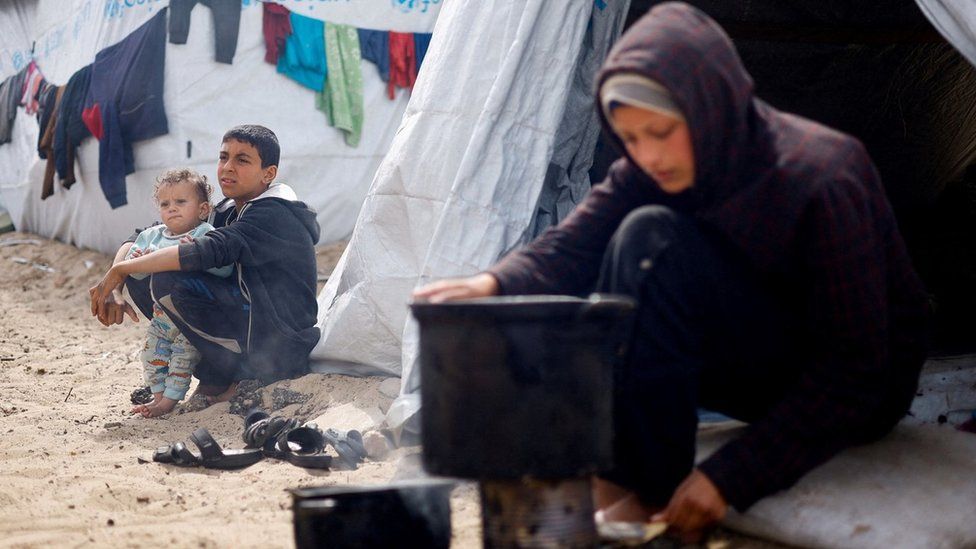Hamas delegation leaves Gaza truce talks in Cairo without deal
- Published

A Hamas delegation has left talks in Cairo without a deal for a ceasefire in Gaza, but the armed group says indirect negotiations with Israel are not over.
It had been hoped that a 40-day truce could be in place for the start of the Islamic month of Ramadan next week.
With more signs of a famine looming, international pressure has only grown.
But Egyptian and Qatari mediators have struggled to seal a deal that would see Hamas free Israeli hostages in exchange for Palestinians held in Israeli jails.
Israel did not send a delegation to Cairo, saying it first wanted a list of the surviving hostages who could be released under the agreement.
Hamas said Israel did not accept its demands for displaced Palestinians to be able to return to their homes nor a complete withdrawal of Israeli forces from Gazan cities.
The war in Gaza began when Hamas fighters stormed into southern Israel on 7 October, killing about 1,200 people and seizing 253 hostages, according to Israeli tallies.
More than 30,800 people have been killed in Gaza since then, the Hamas-run health ministry says.
A Hamas statement said its delegation left Cairo on Thursday morning "for consultation with the leadership of the movement, with negotiations and efforts continuing".
Later, a Palestinian official familiar with the talks told the BBC: "The movement informed the brothers in Egypt and Qatar that it is open to negotiation to stop the aggression against our people."
The delegation had "presented the minimum required by the Palestinians to stop the war, which is the return of the displaced, the withdrawal of Israeli forces, and allowing humanitarian aid and reconstruction", they added.
Egyptian state-affiliated TV channel al-Qahera cited a senior source as saying that the negotiations would resume next week.
Israeli government spokesman David Mencer told reporters that he could not comment on the status of the talks.
But he said: "Needless to say, Israel will do whatever it takes to release our hostages. We've made very, very clear - and this has been reiterated by the US - that, unfortunately, it is Hamas who is the stumbling block right now by not telling us who is alive and who they have in their custody."
The US ambassador to Israel meanwhile stressed that it was a mistake to think that the negotiations were over.
"There are still conversations going on. There's still back and forth. The differences are being narrowed," Jack Lew said at a conference in Tel Aviv.
"Everyone's looking towards Ramadan, which is coming close. I can't tell you that it will be successful, but it is not yet the case that it is broken down."
On Wednesday, the US state department said it believed the obstacles raised were "not insurmountable and a deal can be reached".
The proposed agreement would reportedly see 40 Israeli hostages released in exchange for about 10 times as many Palestinian prisoners being freed from Israeli jails.
More than 130 hostages are still believed to be held by Hamas. Israeli officials have said that at least 30 of them are dead.
Over the course of a proposed 40-day truce, there would be a surge in desperately needed aid entering into Gaza.
During a week-long ceasefire in late November, 105 hostages - most of them women and children - were freed in return for some 240 Palestinian prisoners in Israeli jails.
Without a new deal, there is a higher threat of a further spread of tensions during Ramadan, which this year is due to begin on Sunday or Monday, depending on the lunar calendar.
In another statement on Thursday, Hamas again called on Palestinians in the occupied West Bank to go to the al-Aqsa Mosque compound in occupied East Jerusalem - Islam's third holiest site - during Ramadan to increase pressure on Israel to end the war.
The site - which is also the holiest place in Judaism, known as the Temple Mount - has often been a flashpoint for violence in the decades-old Israel-Palestinian conflict.
Prime Minister Benjamin Netanyahu said in a speech on Thursday that Israelis "must close ranks" and resist pressure to end the military's campaign in Gaza to eliminate Hamas.
He also reiterated that troops would eventually launch an assault on the southern city of Rafah, where an estimated 1.4 million displaced Palestinians are sheltering.
"Whoever tells us not to act in Rafah is telling us to lose the war and that will not happen," Mr Netanyahu said, describing the city as "Hamas's last stronghold".
Meanwhile, amid reports of further deaths in Gaza from starvation, the UK and the US are pressing Israel to increase the flow of aid.
President Joe Biden is set to announce that the US military will construct a port in Gaza to get more humanitarian aid into the territory by sea, senior US officials say - but this is likely to take "a number of weeks" and the 7th Transportation Brigade's military ships have not yet left the US.
On Thursday the US and Jordanian militaries carried out another joint airdrop of 38,000 meals over northern Gaza, where the UN estimates that 300,000 people are facing catastrophic levels of hunger and children are dying of malnutrition and dehydration.
However, the World Food Programme warned that airdrops were "not an option for averting famine" among so many people and urged Israel to allow it to use the Israeli port of Ashdod to deliver aid to the north.
Israel blamed the UN for aid distribution problems. It said 11 private sector aid lorries entered the north overnight and insisted there was "no limit to the amount and movement of aid to northern Gaza".
- Published6 March
- Published5 March
- Published4 March